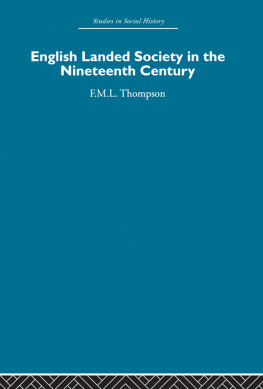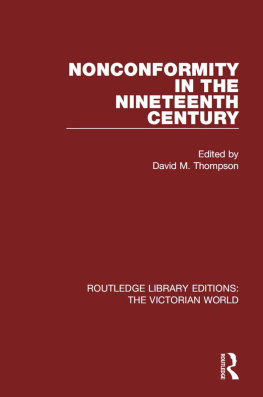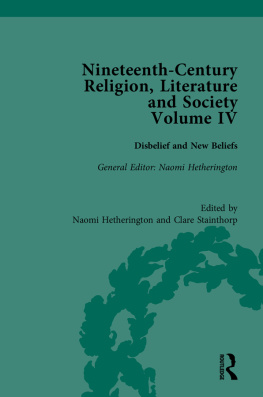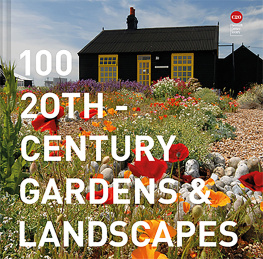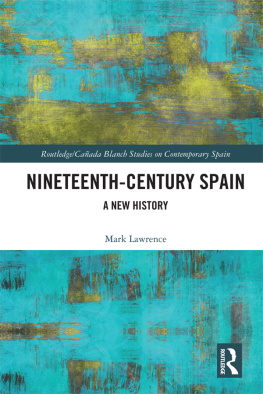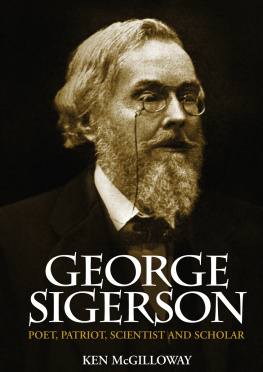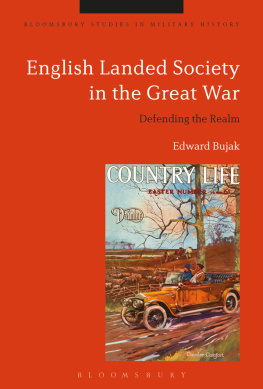STUDIES IN SOCIAL HISTORY
ENGLISH LANDED SOCIETY IN THE NINETEENTH CENTURY
ENGLISH LANDED SOCIETY IN THE NINETEENTH CENTURY
F. M. L. THOMPSON
First published in 1963
This edition published in 2007 by
Routledge
2 Park Square, Milton Park, Abingdon, Oxon, OX14 4RN
711 Third Avenue, New York, NY 10017
Routledge is an imprint of Taylor & Francis Group, an informa business
Transferred to digital print 2013
First issued in paperback 2013
1963 F. M. L. Thompson
All rights reserved. No part of this book may be reprinted or reproduced or utilized in any form or by any electronic, mechanical, or other means, now known or hereafter invented, including photocopying and recording, or in any information storage or retrieval system, without permission in writing from the publishers.
The publishers have made every effort to contact authors and copyright holders of the works reprinted in the Studies in Social History series. This has not been possible in every case, however, and we would welcome correspondence from those individuals or organisations we have been unable to trace.
These reprints are taken from original copies of each book. In many cases the condition of these originals is not perfect. The publisher has gone to great lengths to ensure the quality of these reprints, but wishes to point out that certain characteristics of the original copies will, of necessity, be apparent in reprints thereof.
British Library Cataloguing in Publication Data
A CIP catalogue record for this book is available from the British Library
English Landed Society in the Nineteenth Century
ISBN13: 978-0-415-41285-8 (Hbk)
ISBN13: 978-0-415-84848-0 (Pbk)
ISBN13: 978-0-415-40266-8 (set)
Routledge Library Editions: Studies in Social History
ENGLISH LANDED SOCIETY
IN THE NINETEENTH CENTURY
by
F. M. L. Thompson
Lecturer in Modern History
University College London
LONDON: Routledge & Kegan Paul
TORONTO: University of Toronto Press
First published 1963
in Great Britain by
Routledge & Kegan Paul Ltd
and in Canada by
University of Toronto Press
Printed in Great Britain by
Staples Printers Ltd
F. M. L. Thompson 1963
No part of this book may be reproduced in any form without permission from the publisher, except for the quotation of brief passages in criticism
T HE theme of the decline of aristocratic power has often been treated in the political histories of the nineteenth century, and is indeed inescapable. Almost as often the influence of the landed interest has been prematurely dismissed, in eagerness to write nineteenth-century history in terms of the growth of middle-class power, the democratization of institutions, and the increasing importance of radical and working-class movements. While not seeking to re-tell the political history of the period, this book may contribute towards a more just appreciation of the relative importance of the different major social groups in the life of the country. It deals in the main with the economic history of the landed interest, and with its role as a social group. It includes much agrarian and some industrial history as seen from the landowners point of view, although it is not intended to provide a history of agriculture, still less one of industry or the economy as a whole. It should not be taken as a definitive or exhaustive history of the landed interest: the vast riches of the private archives of landed families are increasingly being made available to historians, and are only just beginning to be tapped. In the present early stage of such research this book is, like all history only more so, an interim report.
The first seven chapters of the book aim to present an analysis and description of the main elements in the institutions and way of life of the landed classes, suggesting their significance for society at large, and emphasizing the forces of change which were at work within an order which in many ways presented a remarkably stable appearance to the outside world. The last five chapters take up the theme of change, and examine the dynamic elements in the economic social and political life of the group, in a sequence of chronological subdivisions of the century and a half with which this book is concerned. The impact of the major changes in the social structure of the country, and of the industrialization of the economy, is hinted at, but no attempt is made to treat in detail those developments which were external to the landed interest. The main concern of the book in the fortunes of the influential classes is such that, reinforced by the limitations of space and records, the histories of the smaller landowners, the farmers, and the labourers have been deliberately confined to a very subordinate position which is not intended to provide a measure of their own intrinsic importance and interest.
It would have been impossible to write a work of this nature without the generous help and cooperation of the owners of private collections of manuscripts, and I am deeply indebted to the following for access to their collections. The Marquess of Ailesbury (the Savemake Papers); Lord Barnard (the Raby Papers); the Marquess of Bath (the Longleat Papers); H. Lorenzo Christie (the Jervaulx Papers); R. F. Dickinson (the Dickinson Papers); Earl Fitzwilliam and the Trustees of the Fitzwilliam Settled Estates (the Milton Papers and the Wentworth Woodhouse Papers); Earl Fortescue (the Castle Hill Papers); Hoares Bank (the Ailesbury Trust Papers and the Banks records); Sir Stephen Hugh Middleton (the Belsay Papers); the Duke of Northumberland (the Alnwick Papers); the Earl of Pembroke and Montgomery (the Wilton Papers); Viscount Ridley (the Blagdon Papers); the Duke of Rutland (the Belvoir Papers); Sir Richard Sykes (the Sledmere Papers); the Earl of Verulam (the Gorhambury Papers). As the entries in the Bibliography show, I have also enjoyed the help of many County Archivists, and been able to take advantage of the service which many owners have rendered to historians by placing their papers in County Record Offices. To all these I should like to express my thanks.
In the years that have passed since I began the research on which this book rests I have been helped by many people, not least those who make the discussions of the Seminar in Modern English Economic History at the Institute of Historical Research so wide-ranging and stimulating. In particular I should like to thank Dr G. E. Mingay, the author of the companion study of the eighteenth century, who has read most of the draft and made many helpful comments. But I owe most to Professor H. J. Habakkuk, who originated modern work in this field, supervised my post-graduate work, and who read and made valuable comments on a part of my final draft. Without him I would never have embarked on this work. Without the help of my wife the book would never have been written. She has not only spurred a naturally reluctant author to work, but has developed an enthusiasm for a subject she found naturally dull, and has helped the book on its way with an immense amount of typing.





